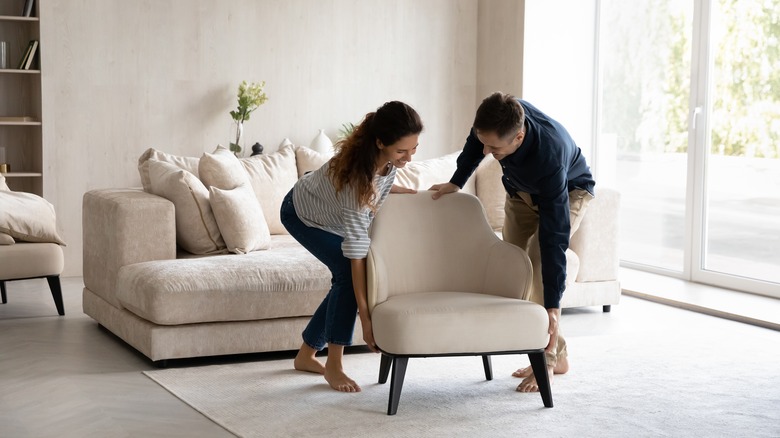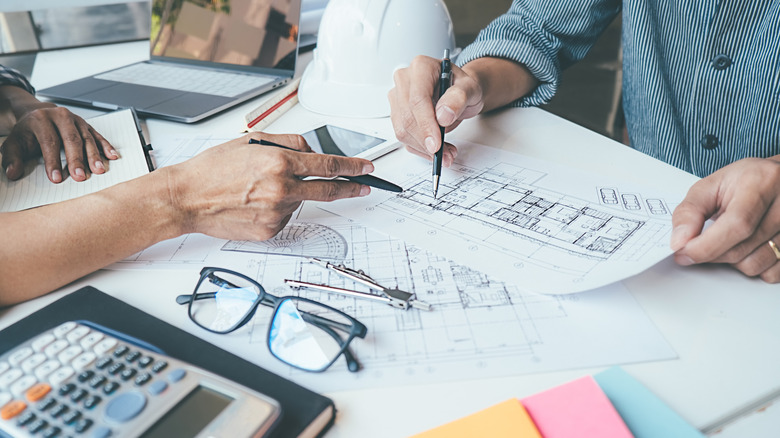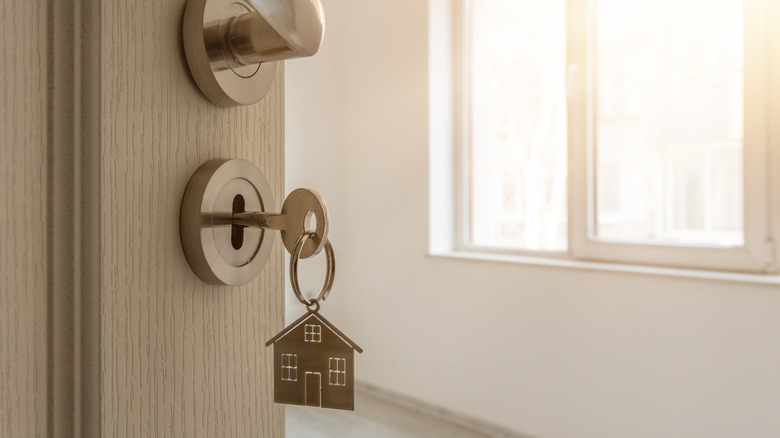Purchasing Vs. Building A Home: Which Is The Best Option?
There are a number of factors to consider when purchasing a new home, including location, size, taxes, and perhaps the most significant — price. If your five-year plan involves buying a new home, you're not alone. In fact, Bigger Pockets estimates that over a third of all Americans are contemplating the same thing. You may even already have a mental picture of your dream home, or an idea of which factors are most important to you.
If you've started taking house tours or browsing Zillow, you've likely already begun to form your preferences and expectations. If you're disappointed that the available options are not matching your vision, there is an alternative. Rather than going through the burden of searching through listings, and inevitably, compromising on your ideal wishlist, you could consider building a new home instead. Of course, both options come with their own pros and cons. While building a home affords you greater customization, it comes at a much higher cost. Purchasing a home is generally simpler, quicker, and more affordable, but you'll inevitably have to compromise. How do you know which path is right for you? Read on for some helpful tips.
Purchasing an existing house: Pros and cons
Though it is the option that the majority of people pursue, shopping for a new home can feel like an arduous expedition. The process of viewing, inspecting, and negotiating over available homes can be tiring and time-consuming, but keep in mind that this process is far quicker and less complicated than designing and building a new home from scratch. Buying a home also saves you the strain of trying to establish a context in the form of landscaping or other outdoor features.
Though you may be tempted by the control that comes with customizing your own home, buying an existing house is undoubtedly more affordable, as well as convenient. Nevertheless, homeowners should proceed carefully despite the current estate fervor. The Washington Post reports that a major regret among new homeowners stems from a lack of knowledge about the house itself and the surrounding area — a problem exacerbated by the competitiveness of the current market and the subsequent pressure on homeowners to waive home inspections. Remember that unknown repair costs in the future can far exceed a fixed inspection fee.
Building a new house: Pros and cons
Fancy some solar panels or an oversized Jacuzzi in the main bathroom? You can add those and more if you choose to build your own home. The ability to customize your house to match your ideal vision is perhaps the most significant upside of building from scratch. As Homes.com points out, additional perks include the opportunities to build around your unique needs, live in your ideal area, and add modern, energy-efficient features that older homes may lack. Beyond practical considerations, creating your own habitat can be psychologically nurturing, according to Psychology Today. Customizing your home affords you a great deal of control and avoids the stress of unexpected surprises that may come with an existing house.
Indulging your vision, however, involves extensive designing and decision-making, not to mention translating those plans for others to execute. Other potential headaches include difficulties finding suitable land to build on, navigating code ordinances and obtaining permits, and the continuing shortage of available subcontractors, per Electrical Contractor Magazine.
What are the differences in cost?
There are several factors that determine the total cost of either purchasing an existing home or building new. With other variables being equal, it generally costs more to build a new home, as reported by the NAHB. In fact, the bills start to add up before ground has even been broken! According to Forbes Advisor, pre-construction expenses include the cost of the land itself, permits, design and management services, and more.
On the other hand, your budget for purchasing an existing home will need to accommodate additional fees such as closing costs, inspection, document preparation, and realtors commission (per Ownerly). You may also need to budget for future renovation projects, especially if you're purchasing an older home or waived the inspection.
Building a home is also a riskier financial investment. To finance a home purchase, you can take out a mortgage, but ROCKET Homes explains that to build new, you'll need to apply for a new construction loan. New construction loans tend to have higher interest rates, but you can refinance into a mortgage after the building is completed — though beware of construction delays that can affect financing.
When you should choose one option over the other
If you're in a position to choose between an existing home and building from scratch, you have more options to achieve your ideal vision. However, location is a top consideration among homeowners (per Moving.com), and certain options may be unavailable depending on where you intend to move.
The cost of building a new home varies from state to state, but areas with higher construction costs also have more competitive real estate markets
(per ZeroDown). Increasing material prices and labor shortages have driven up construction costs, slowing the rate of new residential construction, explains Forbes Advisor. The scarcity of new homes generates competition for existing ones, driving home prices up, too. Some regions may not have suitable homes for sale, and building one is your only option. On the other hand, your desired location may lack available land or have strict zoning laws that limit what can be built.
Buying a home is a very personal decision that cannot come down to general advice, but in any case, knowing all the relevant factors and taking them into consideration based on your specific needs and priorities will help you make the best choice.




